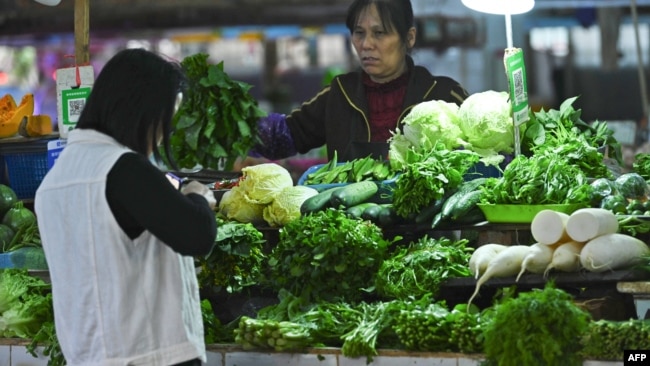国レベルで食糧の需要と供給をコントロールするって、さすがですね。
確かに2021ー2022の冬はラニーニャ現象により、厳冬との予測です。
私たちも、しっかり備えねば!!
さぁ、今回もVOAで英語を学び、正解を知ろう!
Here we go!!
中国、市民に寒さに備えて必需品の保管を呼びかけ(和訳)
China Asks Citizens to Store Necessities ahead of Cold Weather
China’s commerce ministry 中国商務省は、緊急時に備えて生活必需品を蓄えておくよう家庭に呼びかけています。COVID-19の発生や異常な大雨の影響で野菜の価格が上昇し、供給不足が懸念されています。
地元メディアは最近、硬いパンやインスタントラーメン、ビタミン剤、ラジオや懐中電灯など、家庭に備蓄すべき商品のリストを発表しました。
また、一部の中国国民は、ソーシャルメディア上で食料不足を懸念するコメントを寄せています。今週初め、国営メディアはこうした不安を取り除き、同省の声明をさらに詳しく説明しようとしました。
The Economic Daily newspaper 経済日報は、"過剰な想像をしないように"と伝えています。同紙は、今回の命令の目的は、自分の住んでいる地域でロックダウンが行われても、市民が驚かないようにするためだと付け加えています。
The People's Daily 人民日報によると、同省は毎年このような声明を出しているといいます。同省は今年初めにも、自然災害や野菜価格の上昇、最近のCOVID-19事案などを理由に同様の発表を行っています。
同省の今週の声明では、地方の政府関係者に対して、食料供給と価格の固定化のために尽力するよう求めています。また、供給問題が発生した場合には早期に警告を発するように求めているのです。
政府は通常、中国の最も重要な祝日である旧正月の前に、新鮮な野菜と豚肉の供給を増やすために特別な努力をしています。2022年の旧正月は2月初旬になります。
しかし今年は、10月初旬の異常気象により、国内最大の野菜生産地であるShandong山東省の農作物が破壊されたため、こうした取り組みがより緊急性を増しています。また、北西部から北東部にかけてCOVID-19の感染者が発生し、食糧供給を脅かしています。
先週、キュウリ、ホウレンソウ、ブロッコリーの価格が10月初旬の2倍以上になりました。
ここ数日は価格が緩和されています。しかし、エコノミストは、10月のconsumer price inflation 消費者物価上昇率は昨年に比べて大きく上昇すると予想しています。
パンデミックの影響で、食料安全保障への関心が高まっています。政府は、食料安全保障に関する法律を制定し、食料の無駄遣いをなくすための新たな取り組みを計画しています。
商務省は、地方自治体の職員が長期保存可能な野菜を購入し、緊急時の食料配給システムを強化すべきだとしています。また、人々の期待感を和らげるために、商品の価格や需給に関する情報をタイムリーに公開すべきだと付け加えました。
State television 国営テレビは先日、中国は野菜の価格上昇に対処するため、”適切な時期に”野菜の備蓄を放出する計画であると報じました。中国がどのような野菜を備蓄しているのか、またその備蓄量がどの程度なのかは明らかになっていません。
また、国家計画委員会は、野菜の植え替えを適時に行うことを求め、地方政府には成長の早い野菜を支援するよう求めているといいます。
China Asks Citizens to Store Necessities ahead of Cold Weather
China’s commerce ministry has told families to keep a store of daily necessities in case of emergencies. COVID-19 outbreaks and unusually heavy rains caused an increase in vegetable prices, which has raised concerns about supply shortages.
Local media recently published lists of goods to store at home, including hard breads and instant noodles, vitamins, radios and flashlights.
Some Chinese citizens placed comments on social media that expressed fears of food shortages. Earlier this week, state media tried to ease those fears and further explain the ministry's statement.
The Economic Daily newspaper told people not to have "too much of an overactive imagination." The newspaper added that the purpose of the order was to make sure citizens were not surprised if there was a lockdown in their area.
The People's Daily said the ministry makes such statements every year. The ministry made a similar announcement earlier this year because of natural disasters, the increase in vegetable prices and recent COVID-19 cases.
The ministry's statement this week urged local officials to do a good job in ensuring food supplies and fixed prices. The statement also urged officials to give early warnings of any supply problems.
The government usually makes extra efforts to increase fresh vegetable and pork supplies before the Lunar New Year, China's most important holiday. The Lunar New Year date in 2022 falls in early February.
But this year, those efforts have become more urgent after extreme weather in early October destroyed crops in Shandong, the country's biggest vegetable growing area. Outbreaks of COVID-19 cases stretching from the northwest to the northeast of the country also threaten food supplies.
Last week, prices of cucumbers, spinach and broccoli had more than doubled from early October.
Prices have eased in recent days. But economists expect a major increase in consumer price inflation for October compared to last year.
The pandemic has caused an increased concern about food security. The government has written a food security law and is planning new efforts to stop food waste.
The commerce ministry said local officials should buy vegetables that can be stored for long periods of time and strengthen emergency food distribution systems. Information about prices and supply and demand of goods should be released in a timely manner to ease people's expectations, it added.
State television reported recently that China also plans to release vegetable reserves "at an appropriate time" to deal with rising prices. It is not clear which vegetables China holds in reserves and how big those reserves are.
The report added that the state planning body has called for the timely replanting of vegetables and urged local governments to support fast-growing produce.
Words in This Story
flashlight – n. a small electric light that can be carried in your hand and that runs on batteries
commerce - n. activities that relate to the buying and selling of goods and services
consumer – n. a person who buys goods and services
reserves – n. a supply of something that is stored so that it can be used at a later time
英語の小窓
経済関連用語はニュースを聞くとき押さえておきたいですよね。
supply shortages:供給不足
food shortages:食糧不足
supply problems:供給問題
consumer price inflation:消費者物価上昇率
ここには出てきていませんが
self -sufficiency in food/food self-sufficiency rate:食糧自給率
the state of the economy/business/condition:景気
They’re moving upward.景気がいい。
They’re declining。景気が悪い
globalizationglobe:グローバル化
income gap:所得格差
depopulation:人口減少
aging:高齢化
などなど。
スイスに旅行中、農園を見かけなかったことから、知り合いになったスイス人と食糧自給率の話になり、知ってよかった経済用語と思ったことがありました。
浅くていいので幅広く知っていることって大事だなと痛感した次第。
